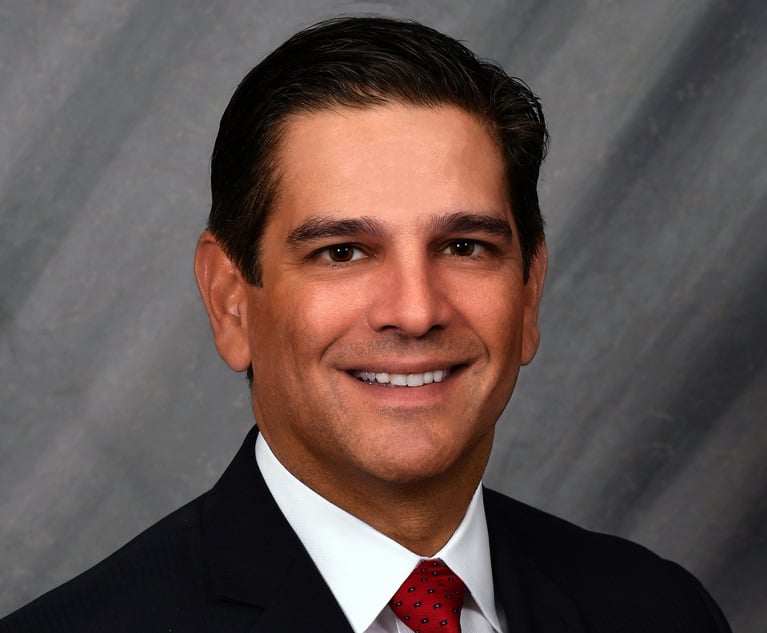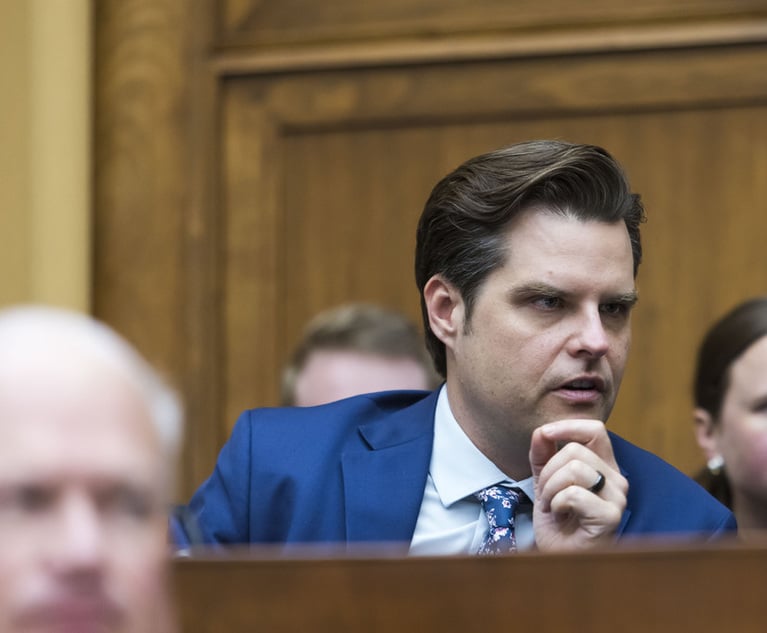Florida Supreme Court to Livestream Arguments on Facebook
The move toward transparency puts Florida leaps and bounds ahead of other courts around the country.
January 23, 2018 at 11:33 AM
3 minute read

The Florida Supreme Court will start livestreaming oral arguments via Facebook next month, a move toward transparency that few, if any, other courts have made.
The state's high court has streamed and archived video of proceedings online for more than 20 years through a partnership with Florida State University. But adding using Facebook Live to stream “will be our next step in moving this highly successful model of openness into the 21st century,” Florida Chief Justice Jorge Labarga said in a statement Tuesday.
Facebook Live is a tool that allows users to livestream events through the social media platform using their phone or camera.
Florida was already decades ahead of the U.S. Supreme Court and other federal courts, which are still hemming and hawing over broadcasting court proceedings. U.S. Chief Justice John Roberts said in October livestreaming ”could adversely affect the character and quality of the dialogue between the attorneys and Justices.”
The U.S. Court of Appeals for the Eleventh Circuit, which includes Miami, only agreed in 2016 to post audio of proceedings online at all, falling behind nearly all the other federal appellate courts. Some circuits have adopted audio livestreaming—the D.C. Court of Appeals did so last month—but most have not.
State court systems tend to be more open, but livestreaming is still new to some. New York's state appellate courts completed their move to live video in September.
Florida was the first state to allow TV news stations to broadcast from courtrooms in 1975, “a time when every other court in the nation refused it,” Labarga said in Tuesday's statement.
“This court's experiment with transparency showed everyone a better way to balance First Amendment rights against the rights of people involved in a trial or appeal,” he said.
The Florida Supreme Court is likely breaking new ground by livestreaming via social media. A court spokesman said a message to a nationwide listserv of state court public information officers turned up no other courts that took the same leap toward transparency.
The move to Facebook Live is part of a broader effort to raise public awareness about Florida courts. In 2015, the state's justices unanimously approved a communication plan that included expanding the Florida Supreme Court's social media presence and launching a podcast called “Beyond the Bench.”
The justices' goal is not just transparency for transparency's sake. Labarga and his colleagues have said they believe increasing the visibility of the court system's work will help stave off the existential threat posed by state budget cuts. Last year, Florida judges got their first pay raise in 10 years.
“If people don't understand that we're doing justice well, it is a problem for our long-term security and freedom,” Justice C. Alan Lawson said last year. “Get some stories to go viral.”
This content has been archived. It is available through our partners, LexisNexis® and Bloomberg Law.
To view this content, please continue to their sites.
Not a Lexis Subscriber?
Subscribe Now
Not a Bloomberg Law Subscriber?
Subscribe Now
NOT FOR REPRINT
© 2024 ALM Global, LLC, All Rights Reserved. Request academic re-use from www.copyright.com. All other uses, submit a request to asset-and-logo-licensing@alm.com. For more information visit Asset & Logo Licensing.
You Might Like
View All
O'Melveny Secures Global Clearances for Korean Air-Asiana Merger

Orlando Man's Fake Political Fundraising Websites Stole Donations, Feds Say

Ice Miller Debuts New Miami Office After Landing Two Greenspoon Marder Attorneys
2 minute readTrending Stories
- 1Call for Nominations: The Recorder and Law.com's California Legal Awards 2025
- 2The Week in Data Dec. 13: A Look at Legal Industry Trends by the Numbers
- 3Antitrust Class Actions Against CVS, Other Pharmacy Benefit Managers Are Piling Up
- 4Judge Grinds NY's Cannabis Licensing Regime to a Halt Again
- 5On the Move and After Hours: Barclay Damon; VLJ; Barnes & Thornburg
Who Got The Work
Michael G. Bongiorno, Andrew Scott Dulberg and Elizabeth E. Driscoll from Wilmer Cutler Pickering Hale and Dorr have stepped in to represent Symbotic Inc., an A.I.-enabled technology platform that focuses on increasing supply chain efficiency, and other defendants in a pending shareholder derivative lawsuit. The case, filed Oct. 2 in Massachusetts District Court by the Brown Law Firm on behalf of Stephen Austen, accuses certain officers and directors of misleading investors in regard to Symbotic's potential for margin growth by failing to disclose that the company was not equipped to timely deploy its systems or manage expenses through project delays. The case, assigned to U.S. District Judge Nathaniel M. Gorton, is 1:24-cv-12522, Austen v. Cohen et al.
Who Got The Work
Edmund Polubinski and Marie Killmond of Davis Polk & Wardwell have entered appearances for data platform software development company MongoDB and other defendants in a pending shareholder derivative lawsuit. The action, filed Oct. 7 in New York Southern District Court by the Brown Law Firm, accuses the company's directors and/or officers of falsely expressing confidence in the company’s restructuring of its sales incentive plan and downplaying the severity of decreases in its upfront commitments. The case is 1:24-cv-07594, Roy v. Ittycheria et al.
Who Got The Work
Amy O. Bruchs and Kurt F. Ellison of Michael Best & Friedrich have entered appearances for Epic Systems Corp. in a pending employment discrimination lawsuit. The suit was filed Sept. 7 in Wisconsin Western District Court by Levine Eisberner LLC and Siri & Glimstad on behalf of a project manager who claims that he was wrongfully terminated after applying for a religious exemption to the defendant's COVID-19 vaccine mandate. The case, assigned to U.S. Magistrate Judge Anita Marie Boor, is 3:24-cv-00630, Secker, Nathan v. Epic Systems Corporation.
Who Got The Work
David X. Sullivan, Thomas J. Finn and Gregory A. Hall from McCarter & English have entered appearances for Sunrun Installation Services in a pending civil rights lawsuit. The complaint was filed Sept. 4 in Connecticut District Court by attorney Robert M. Berke on behalf of former employee George Edward Steins, who was arrested and charged with employing an unregistered home improvement salesperson. The complaint alleges that had Sunrun informed the Connecticut Department of Consumer Protection that the plaintiff's employment had ended in 2017 and that he no longer held Sunrun's home improvement contractor license, he would not have been hit with charges, which were dismissed in May 2024. The case, assigned to U.S. District Judge Jeffrey A. Meyer, is 3:24-cv-01423, Steins v. Sunrun, Inc. et al.
Who Got The Work
Greenberg Traurig shareholder Joshua L. Raskin has entered an appearance for boohoo.com UK Ltd. in a pending patent infringement lawsuit. The suit, filed Sept. 3 in Texas Eastern District Court by Rozier Hardt McDonough on behalf of Alto Dynamics, asserts five patents related to an online shopping platform. The case, assigned to U.S. District Judge Rodney Gilstrap, is 2:24-cv-00719, Alto Dynamics, LLC v. boohoo.com UK Limited.
Featured Firms
Law Offices of Gary Martin Hays & Associates, P.C.
(470) 294-1674
Law Offices of Mark E. Salomone
(857) 444-6468
Smith & Hassler
(713) 739-1250







